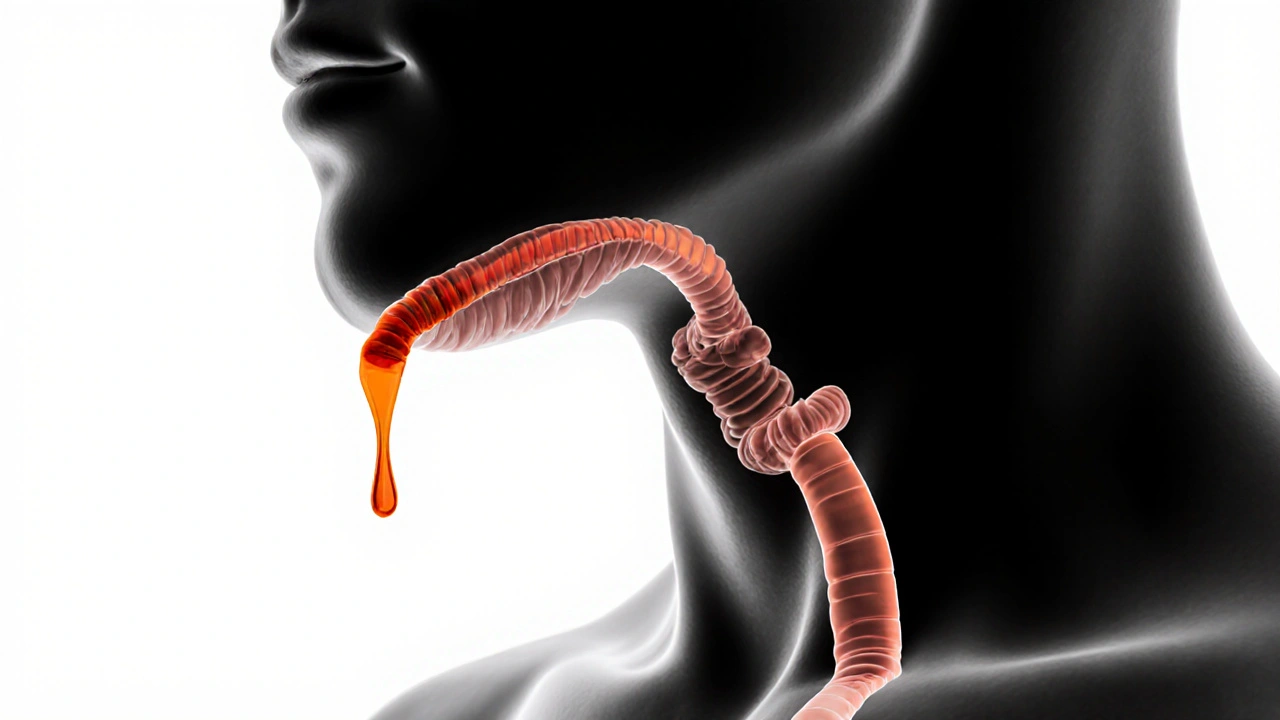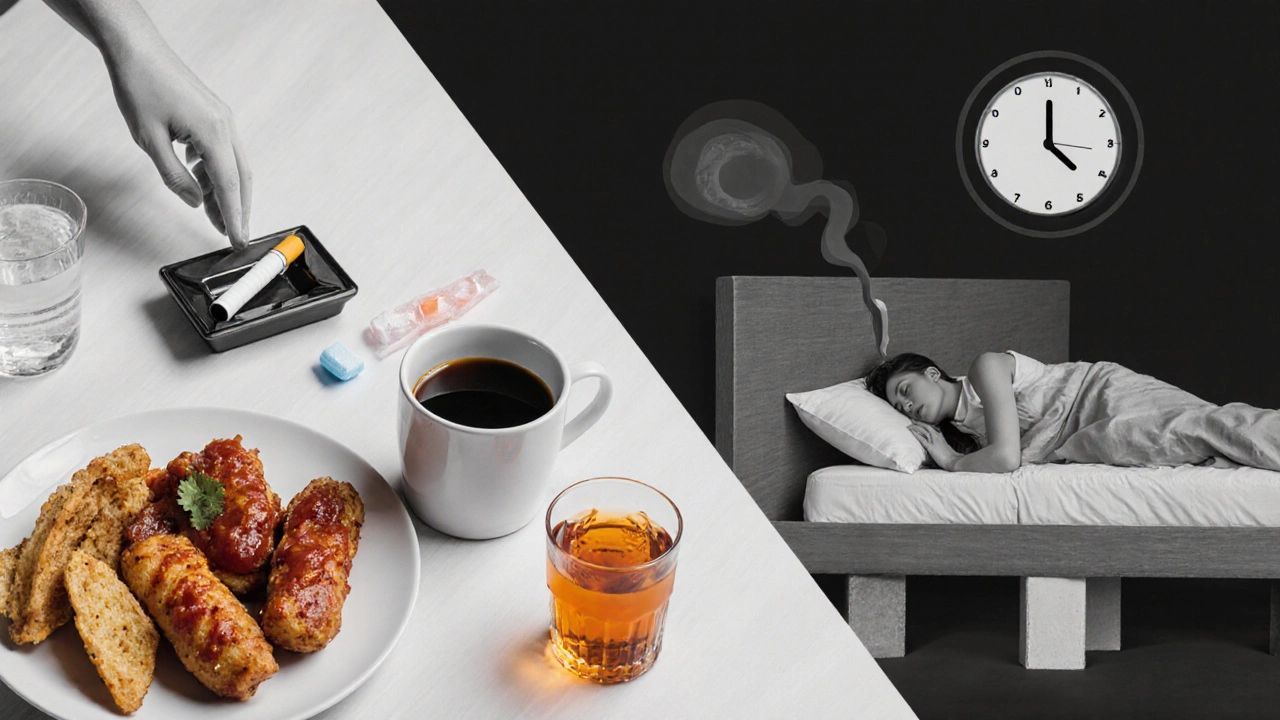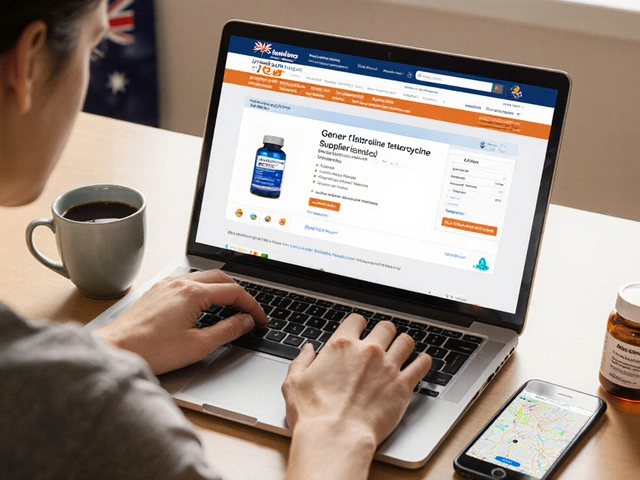
Sore Throat Cause Checker
This interactive quiz helps determine if your sore throat is likely related to acid reflux. Based on your answers, it will provide personalized insight into whether reflux might be the cause and suggest next steps.
Your Results
Based on your answers, 4 of your answers indicate potential acid reflux connection. 2 answers suggest other potential causes.
This is consistent with laryngopharyngeal reflux (LPR), where acid reaches your throat without classic heartburn.
When you hear Acid Reflux is a condition where stomach acid flows back into the esophagus, causing burning sensation and irritation, you might picture heartburn after a big meal. But the acid can travel higher, reaching the throat and leaving it raw.
A Sore Throat is a pain, scratchiness, or irritation of the throat that worsens when swallowing is one of the most common reasons people visit a doctor. While colds, allergies, and infections top the list, many don’t realize that the same acid that burns their chest can also irritate their throat.
What Is Acid Reflux, Really?
Acid reflux happens when the lower esophageal sphincter (LES) - the ring of muscle that separates the stomach from the esophagus - fails to close tightly. When that valve leaks, stomach contents, especially hydrochloric acid, splash back up. The medical term for chronic reflux is GERD (gastro‑esophageal reflux disease). If the reflux reaches the voice box and throat, doctors call it Laryngopharyngeal reflux (LPR). Unlike classic heartburn, LPR often shows up as a persistent sore throat, hoarseness, or a feeling of a lump in the neck.
How Acid Reflux Harms the Throat
When acid climbs past the esophagus, it encounters the delicate lining of the throat, which isn’t built to withstand corrosive fluids. The result is inflammation, swelling, and the classic “scratchy” sensation. Over time, repeated exposure can damage the vocal cords, leading to chronic hoarseness or even a weak voice. Some people also notice a sour taste at the back of their mouth or frequent throat clearing - both tell‑tale signs that acid is making a surprise appearance.
Triggers That Link Reflux to a Sore Throat
- Spicy or fatty foods: These relax the LES, making it easier for acid to escape.
- Caffeine and alcohol: Both increase stomach acid production and lower sphincter pressure.
- Smoking: Nicotine weakens the LES and irritates the throat directly.
- Late‑night meals: Lying down soon after eating lets gravity work against you.
- Carbonated drinks: Bubbles expand in the stomach, pushing acid upward.
- Medications: Certain pain relievers, antihistamines, and calcium channel blockers can relax the LES.
Notice a pattern? Most of these triggers also aggravate typical sore‑throat culprits like allergies or infections, which can make it tricky to pinpoint the real cause.

Distinguishing Reflux‑Related Sore Throat from Other Causes
To figure out whether acid is the guilty party, compare the symptom set against other common offenders. The table below highlights the main differences.
| Feature | Acid Reflux (LPR) | Throat Infection (e.g., strep) | Allergy‑related |
|---|---|---|---|
| Onset time | Often after meals or at night | Sudden, often with fever | Seasonal, linked to pollen exposure |
| Typical pain | Burning, scratchy, worsens when lying down | Sharp, worse with swallowing | Itchy, mild soreness |
| Associated symptoms | Heartburn, sour taste, chronic cough | Fever, swollen lymph nodes, white patches | Runny nose, watery eyes, sneezing |
| Response to antacids | Usually improves within minutes | No effect | No effect |
If you notice rapid relief after taking an over‑the‑counter antacid, reflux is likely the culprit.
Home Remedies and Lifestyle Tweaks
- Elevate the head of your bed: Raising it 6‑8 inches lets gravity keep acid down while you sleep.
- Adopt the 3‑hour rule: Finish meals at least three hours before bedtime.
- Chew gum after eating: It stimulates saliva, which neutralizes acid.
- Stay hydrated: Water dilutes stomach acid and keeps throat tissues moist.
- Identify trigger foods: Keep a food diary for two weeks; note when throat irritation spikes.
- Quit smoking: Even a few cigarettes a day can weaken the LES.
- Limit caffeine and alcohol: Swap coffee for herbal tea and choose low‑alcohol beverages.
Most people see a noticeable drop in throat discomfort within a week of making these changes. If symptoms linger, it’s time to explore medical options.

Medical Treatments and When to Seek Help
Doctors have a few proven tools to tame reflux and, by extension, the sore throat.
- Antacids (e.g., calcium carbonate): Fast‑acting, great for occasional flare‑ups.
- H2‑blockers (e.g., ranitidine, famotidine): Reduce acid production for up to 12 hours.
- Proton pump inhibitors (PPIs) (e.g., omeprazole, esomeprazole): The most potent acid suppressors; often prescribed for 8‑12 weeks.
- Alginate therapy: Forms a foam barrier that floats on stomach contents, keeping acid from climbing.
- Prokinetics (e.g., metoclopramide): Help the stomach empty faster, lowering pressure on the LES.
If you experience any of the following, book an appointment:
- Persistent sore throat lasting more than three weeks.
- Unexplained weight loss or difficulty swallowing.
- Frequent nighttime coughing or hoarseness.
- Warning signs of esophageal damage, such as blood in vomit or black stools.
In some cases, a doctor may order an upper endoscopy to check for esophagitis or a hiatal hernia-both can worsen reflux.
Quick Checklist: Is Your Sore Throat Reflux‑Related?
- Do symptoms flare after meals or when lying down?
- Do antacids provide quick relief?
- Is there a chronic cough or hoarseness accompanying the sore throat?
- Have you noticed a sour or bitter taste in the back of your mouth?
- Do you regularly consume trigger foods, caffeine, alcohol, or smoke?
If you answered “yes” to most of these, give the lifestyle tweaks a try and watch the difference. Remember, a sore throat isn’t always a cold-sometimes your stomach is the hidden troublemaker.
Frequently Asked Questions
Can acid reflux cause a sore throat without heartburn?
Yes. Many people with laryngopharyngeal reflux never feel classic heartburn. The acid sneaks up to the throat, causing irritation without a burning chest.
How long does it take for antacids to soothe a reflux‑related sore throat?
Most over‑the‑counter antacids start working within 5‑10 minutes. Relief usually lasts 1‑2 hours, so you may need a repeat dose if symptoms linger.
Is it safe to use proton pump inhibitors for a sore throat?
PPIs are safe for most adults when taken as prescribed. They’re designed for longer‑term acid control, which can heal throat tissue over weeks. Discuss any long‑term use with your doctor.
What foods should I avoid if I suspect reflux‑related throat pain?
Skip spicy sauces, fried foods, citrus fruits, chocolate, mint, caffeinated drinks, and alcohol. Opt for lean proteins, oatmeal, non‑acidic vegetables, and herbal teas.
Can a sore throat be a sign of something more serious than reflux?
Absolutely. Persistent pain, difficulty swallowing, unexplained weight loss, or blood in the sputum warrants immediate medical evaluation to rule out infection, ulcer, or even esophageal cancer.
Do I need a prescription for a hiatal hernia if it’s causing my sore throat?
A hiatal hernia itself isn’t a disease, but it can exacerbate reflux. Treatment usually involves the same lifestyle changes and medications used for GERD, often without surgery unless complications arise.
9 Comments
Write a comment
More Articles

Opioid Reactions: How to Tell Itching from a True Allergy and What to Do
Most opioid itching isn't an allergy - it's a side effect. Learn how to tell the difference, which opioids cause less itching, and what to do if you're labeled allergic when you're not.



Russell Abelido
October 16, 2025 AT 19:41Wow, reading about the silent assault of acid on the throat feels like watching a tragedy unfold inside your own body 😊.
The way the LES slacks, letting fiery bile climb upward, is almost philosophical – a reminder that even the most steadfast gates can be corroded by relentless pressure.
Every time you feel that scratchy fire, imagine tiny rebels marching up the esophagus, demanding attention.
They whisper that the night is a cruel ally, when gravity abandons you and the acid rises like a dark tide.
Your throat, delicate as a silk curtain, bears the brunt, swelling with indignation.
It's heartbreaking to think that a simple late‑night pizza can trigger such drama, yet we persist in indulgence.
The sour taste at the back of your mouth is the universe's way of saying, “I warned you”.
Elevating the head of your bed becomes a silent guardian, a subtle hill against the rolling waves.
Chewing gum after meals is like sending in peacekeepers – saliva neutralizes the invader.
Hydration, too, is the gentle rain that calms the scorching flames.
When you finally notice relief after an antacid, it's the fleeting applause of a crowd that finally hears your sigh.
But remember, applause without a standing ovation is fleeting; long‑term changes are the true curtain call.
Embrace the three‑hour rule as a pact with your future self, a promise of respect.
If the hoarseness lingers, consider the voice a wounded poet seeking healing through proper care.
In the end, this battle is not just about medicine, but about listening to the subtle cues your body whispers, and honoring them with compassion 😊.